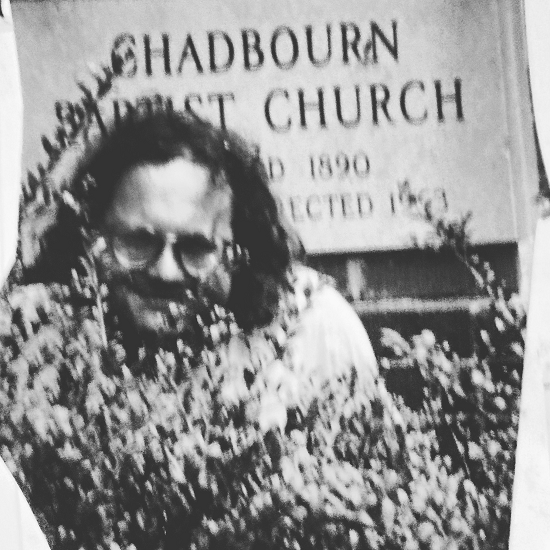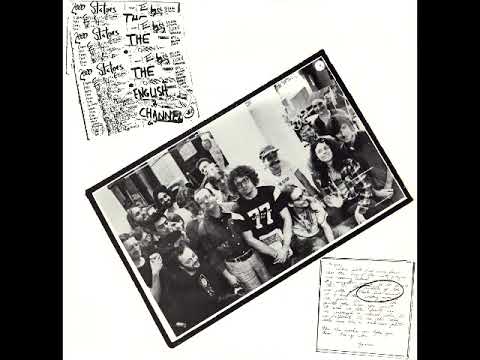Photos courtesy of Eugene Chadbourne
Eugene ‘Doc’ Chadbourne’s career has been absurdly prolific. According to Discogs he has played on at least 358 albums. From John Zorn and Jello Biafra to the Violent Femmes and Camper Van Beethoven, Toshinori Kondo, Carla Bley, Han Bennink, Susan Alcorn, Corrosion Of Conformity, Henry Kaiser, Wadada Leo Smith, They Might Be Giants, Half Japanese, Derek Bailey, Polly Bradfield and Anthony Braxton, to name but a few, he has worked with hundreds who are pioneers in their own right. He has been friends with hundreds more. He has played live constantly for decades, both on his own and in groups, performing everywhere from his local record store to the Soviet Bloc.
He is a cult figure, yet sometimes it feels strange that he is not more widely revered. To some extent he’s a victim of his own inventiveness, too mercurial to be summed up in an easily digested narrative. His distinctive high-pitched vocals and the surreal, comedic nature of a lot of his work – in 1991 he released an album of classical piano and ‘electric rake’ duets – has sometimes put him at odds with the more po-faced alternative rock canon. His embrace of whatever he finds interesting, whether traditional country and western or radical jazz, and his trenchant left-wing politics, make for an uncompromising, for some uncomfortable, mix. When writing a feature on him, it is hard to know where to begin.
Perhaps it’s best to start in the present. At the beginning of this month, Chadbourne and Jim McHugh, of the psychedelic prog-jazz outfit Sunwatchers, released a collaborative album called Bad Scene. McHugh, when writing press material for the record, found it similarly difficult to sum Chadbourne up. “I was overwhelmed by the idea of trying to get it all in, all his history,” he tells tQ on a video call. “Once I was tending a bar, and I was listening to Prince Far I’s Dub Encounters 3. I heard this fucked up guitar at the end. I was like, ‘I know that sound! Could it be? Eugene?’ I called him. ‘Eugene, did you ever play on a Prince Far I session?’ He’s like, ‘I don’t remember. Maybe!’ That’s the magic of him. It’s always possible!”
McHugh grew up near Greensboro, North Carolina, where Chadbourne had been based since the early 1980s. As a teenager, McHugh often saw Chadbourne playing in the local record store. “Before the internet was super ubiquitous, whatever washed up on your redneck desert island, whatever seemed different from the music playing in cars passing by to throw bottles at you for skateboarding, was the answer,” McHugh says. “Then you’d see Eugene playing a Merle Haggard song, going into a cover of Dead Kennedys or something even weirder, then into some free jazz piece. He implicitly and explicitly linked music that I knew, music that I didn’t know and wanted to know about, and music that I still don’t know about to this day.”
Chadbourne, who speaks to tQ in a series of emails, had moved to Greensboro in the 1980s. He was born in Mount Vernon, New York, and grew up in Boulder, Colorado. “My mother and father and my brothers, we all liked different kinds of music and like many kids we made up our own songs,” he says. “Both of my parents encouraged creativity in different ways, my mother was a great combination of influences, the German work ethic, she absolutely loathed rock and roll and wanted the Nazis back to deal with the hippies – this from a [German Jewish] World War Two refugee! – but she conspired for me to buy electric guitars and amplifiers as long as I would earn money to pay for the stuff myself.”
At twelve years old, Chadbourne got his first transistor radio, beginning “a period of freedom associated with personal listening tastes. “It was especially memorable listening to it when on duty as safety patrol at Whittier Elementary. The Rolling Stones, Dave Clark Five, The Beatles, plus all the horrible stuff you had to endure until it fell off the charts, [such as] Barry Sadler’s ‘Ballad Of The Green Berets’…” He and his older brothers listened to Denver, Colorado’s KIMN (100.3 FM), eager for their personal favourites to do well in the charts. When the family was briefly broken into two units while his father taught in Los Angeles, his brothers mailed him the weekly KIMN Top 50 sheet distributed to Colorado record stores.
It was here, with Johnny Cash, Roger Miller, Tammy Wynette and Loretta Lynn on regular rotation, that country music first became a key ingredient in Chadbourne’s mix of influences. Look hard and you can also spot, in an embryonic state, the kind of politics still shot through his core. “’Skip A Rope’, an independent single with intensely political lyrics, was a top 10 hit, and while my hit parade listening dwindled to almost nothing in my later years as a professional musician, hearing Johnny Paycheck’s ‘Take This Job And Shove It’ played almost hourly inspired me to do a cover as well as launch a study of his music.”
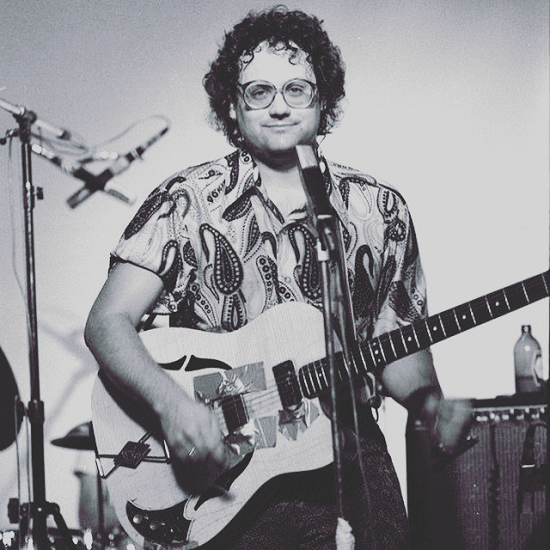
All the while, popular music was enjoying a period of infatuation with the avant-garde. “At teenage parties kids listened to a piece of musique concrete over and over, it was the Beatles’ ‘Revolution #9’” When other artists like King Crimson, Tim Buckley, Alvin Lee’s Ten Years After and Savoy Brown began incorporating jazz, his interest was piqued. “But once you start enjoying the jazz feeling in music and that kind of improvisation, listening to rock records with jazz influences is just not as exciting as Eric Dolphy, John Coltrane, Charles Mingus, Rahsaan Roland Kirk, Duke Ellington, Charlie Parker, Anthony Braxton…” Years later, it would be Braxton who would help persuade Chadbourne to embark on a career of his own, and who would for decades be one of his most fruitful collaborators.
Chadbourne’s politics intensified as the 1960s wore on. “My oldest brother Larry convinced me the war in Vietnam was no good. He claims I wanted to be a marine prior to that.” The Black Panthers “made a big impression on me speaking at the Boulder courthouse” when they were travelling the USA starting chapters. “Around that time radical political organizations routinely spoke in public in Boulder, I am sure the Black Panthers had plenty of other events on campus, my oldest brother was in SDS [Students For A Democratic Society], the [militant SDS faction] Weathermen tried to speak at Boulder High but were barred, they had to speak on the lawn.” In 1968, when Chadbourne was 14, “the murder of Martin Luther King Jr hit us really hard. My little group of friends and I burst into tears at a donut shop in the North Boulder shopping centre. The owner came over and asked if our girlfriends had dumped us.”
Then, at the turn of the decade, Chadbourne fled America to Calgary, Canada, to avoid being drafted to fight in the Vietnam War. He found work on the Calgary Herald as a copyboy, with no idea what the job entailed, having lied in his application that he had been a proof-reader at the Denver Post. “The explanation that this individual does ‘everything’ as part of their job was no help,” he says. It was a particularly strange time at the paper, staffed by another, weed-dealing copyboy, a permanently drunk photo editor, “even a fellow free jazz nut who practically gave the publisher a heart attack one weekend by replacing the plot synopsis of a popular series with a passage from Finnegan’s Wake.”
As the youngest in the newsroom, Chadbourne was assigned rock and roll reviews. “I came right out swinging when I nabbed the Dr. John assignment,” he recalls. “I commented that I could not figure out why the opening act, The Meters, would bother doing a cover version of ‘Hotel California’. This started a backlash against my reviews that picked up steam when I panned Uriah Heep, then Queen. The hate mail was so voluminous that the editors and publishers got excited and kept giving me raises. My Miles Davis review—the only good one this band got on their entire North American tour that year—also got backlash from the moldy fig crowd who wanted to hear My Funny Valentine.”
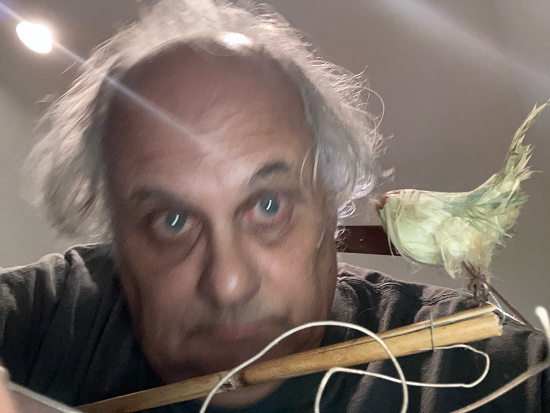
“Besides the obvious post-adolescent thrill of having one’s sarcastic tendencies encouraged,” he continues, “a valuable thing I learned from all this is that bad reviews don’t mean much, the best artists deal with them graciously, I am much less impressed with the people that turn them into feuds. Seeing that Phil Ochs chose to quote from his worst reviews in one of his published songbooks impressed me: ‘Too bad his guitar playing would not suffer were his right hand webbed.’ I still remember a bad review I got in the high school paper; they compared my singing to a ‘treed cat.’ My brother Larry reminisces about a film review I wrote in the same paper, describing the editing of a film as being done ‘by a blind man with a lawn mower.’ I gave the Canadian folksinger Valdy a bad review in the Herald, and I was amazed that at the Vancouver Folk Festival more than 30 years later, we were both performing on the same stage line-up, he quoted from that review and made jokes about it before almost every song he played!”
As well as working at the paper, Chadbourne was starting to write songs of his own and recording them on tape. It was Anthony Braxton, one of the jazz artists who had so enraptured him in his teens, who provided the impetus to get it pressed. Braxton, having seen a concert Chadbourne had organised, “told me I simply had to put out a record of my solo guitar music.” To do so Chadbourne formed his own label, Parachute Records, named for the Canadian Arts Council-funded Parachute Center For Artistic Research that was ran by his friends and, crucially, was in possession of a 4-track reel to reel recorder. The label outlived the arts centre, and followed him when he returned to the US in the summer of 1977 after President Jimmy Carter announced an amnesty for draft dodgers. “To have a career in the kind of music I wanted to play really required a return to the USA I was convinced, the music scene in Canada has its good points but at the time I really had my sights set on New York City, Anthony Braxton goading me as well that I could join his band if I relocated.”
Chadbourne has formed many relationships during his time as a musician, but few so important as that with Braxton, with whom he still records; only last year the two put out an eight disc set of improvisations made in 2017. “There is no over-emphasizing his importance to me,” Chadbourne says. “Even before I met him, his music had made an impact on my guitar playing and ideas about composing. Personally, he encouraged me to become a professional, to learn to read music, to relocate to the East Coast and most importantly to focus on my own music and not get sucked into the career-obsessed New York City scene with all its resume-stuffing bullshit.”
While resisting the resume-stuffing, from New York Chadbourne was collaborating constantly with fellow members of the New York avant-garde, inviting counterparts across the world to join in. One of his most crucial releases from the era, 2000 Statues And The English Channel, saw Chadbourne assemble an entire multinational orchestra of pioneers – the late, great jazz trumpeter Toshinori Kondo, the English multi-instrumentalist Fred Firth on guitar, Steve Beresford on his trademark toy drums and piano, the now-revered composer John Zorn on saxophone, violinist Polly Bradfield – delivering a monolith of a performance. It was Zorn and Bradfield who were of particular importance. “It was the nucleus of everything going on musically at the time for me, socially as well,” Chadbourne says of their band, The 300 Statues Trio. “Yet it was not really well documented, recording something well back then was difficult and much of this crowd was brainwashed against cassette sound, etc. The only recordings of this group are pretty horrible in terms of sound quality.”
So too does Chadbourne have regrets about the recordings that remain to document Shockabilly, the group he formed in 1982 with bassist Mark Kramer and drummer David Licht who performed avant-garde reworkings of rockabilly standards. “After living [in Calgary], where I had my own Bob Thiele, Wade McGregor, sneaking me into the finest studio in the province at no cost I wound up in New York where if a dude dragged his reel to reel to a gig he would start pressuring you about royalties for the recording before you had even heard it,” Chadbourne says. “Recording technology really lagged for years in terms of easily making good sounding live recordings and the crowd I fell into had been brainwashed about what constituted acceptable ‘sound quality.’”
Nevertheless, Shockabilly are one of the projects Chadbourne remains best known for. He reads little into that fact, other than that “we toured with that band pretty much everywhere we could. I think the only place we ended up not driving to 16 hours band and forth or whatever to play on the door was Miami. We were always riding that crest of enthusiasm that happens with music ensembles that get to do that and have the freedom to do what they want on stage, no matter how little sleep we got or whether someone had just puked up dinner outside the club.” While he’s dissatisfied with the four studio albums the band put out, aside from the occasional track, the live recordings drummer Licht captured on a cassette player from the era “are just really tight, energetic, crazy… Everything David and I did, we rehearsed like crazy. He had a house for a while in Greensboro and two, sometimes three nights a week we would be rocking the fuck out of that place, the walls would be shaking.”
Whether due to Shockabilly’s incessant touring, or the fact that the rise of cassette culture was enabling Chadbourne to release more and more recordings, in the second half of the 1980s there was a time when he approached fame, or at the very least cult stardom. He became covered extensively in the underground American music press, and, thanks to the amount of his European shows, in mainstream British publications too, withMelody Maker praising his “crazed genius.” According to Aimee Cliff writing in DUMMY in 2013, one issue of Sound Choice magazine in 1986 reviewed no fewer than ten Eugene Chadbourne releases.
Chadbourne doesn’t read too much into this. “There was much more press back then of all sorts,” he says. “There was a ton of self-published fanzines and then more mainstream publications, especially SPIN, tried to pick up on the content. SPIN paid me to write some humorous recipe columns and we could walk down to the grocery store and buy a copy, my kids thought it was amazing.” In addition, he points out, “Men’s skin magazines were always looking for some ink to fill the space between the picture spreads, the Playboy standard of the hipster looking at chicks and digging his jazz sides hung on for decades, so one of my fondest memories regarding peaks of press coverage is when GENT magazine, specializing in pictures of women with huge breasts, hired a fairly well known (to me) music critic who preceded to give my There’ll Be No Tears Tonight a rave review. I went to the truck stop down the street and bought a copy, showed it to the clerk and he was really impressed, they gave me free breakfast that day!”
By now, Chadbourne had moved to Greensboro, having been introduced to the town by Licht. “We could live in a house with some sort of yard and greenery and when my little groups played everyone actually profited,” he says. A hole-in-the-floor venue called Niteshade Café, located under a restaurant called Hong Kong House, acted as a crucial benefactor after attempts to make ends meet with a return to journalism proved fruitless. Eventually, however, “the bottom fell out of that aspect of the club scene” and he was earning most of his income on tour, particularly overseas. He almost left the country entirely, but his children were too attached to Greensboro. “That made me think about the original decision differently, like it made sense but for a different reason, the original attraction of the music scene was not what I needed to depend on anymore. “
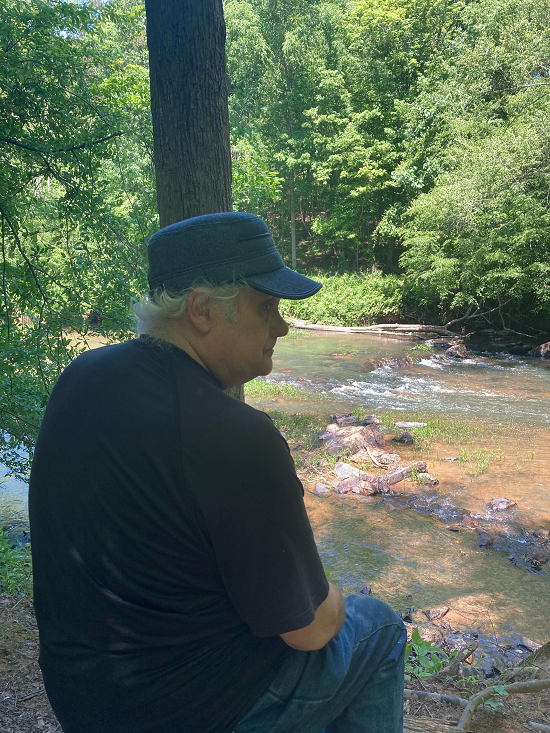
Greensboro was the site of the 1960 Greensboro Sit-In, one of the most important launchpads for the decade’s civil rights movement. In 1979 it saw the Greensboro massacre, where five protestors including four members of the Communist Workers Party were killed by members of the Ku Klux Klan and the American Nazi Party – allegedly with help from undercover agents in the local police – during the communists’ efforts to organise local textile workers. The perpetrators were repeatedly acquitted at trial, though the city offered a formal apology last October. It’s also home to a large student population thanks to its location in the centre of the so-called ‘Research Triangle’ of major North Carolina universities, and is the home of the historically Black College North Carolina A&T. “It’s a highly politicised scene and Eugene fits into that because he wrote protest music, and wasn’t accepted by mainstream rock,” argues Jim McHugh, who grew up amongst it in the 1990s. “Greensboro never really recognised him. He’s one of the most interesting avant-garde musicians in the world.”
After watching Chadbourne play those “life-changing, mind-bending shows” in his local record shop as a teenager, McHugh struck up an acquaintance, once drunkenly commandeering the drumkit when Chadbourne played a show at his DIY space The Onion Cellar. They reconnected in the early 2000s for a planned collaboration, when McHugh was in Athens, Georgia fronting a 12-piece band called Dark Meat who played “Albert Ayler covers and punk rock, filtered through country music and southern rock. Stuff that was made accessible to me through seeing Eugene.” The collaboration never happened but they were back in touch, and in 2015 McHugh helped him book a run of shows in his then-home of New York. During a three-day gap in the schedule, “I said ‘do you wanna just make a record with my band Sunwatchers?’” Inspired by Chadbourne’s cover of Minutemen’s ‘Price Of Paradise’ on his 1987 record Kill Eugene, it was a record entirely of Minutemen, Doug Sahm and Henry Flynt covers called 3 Characters. You can hear the very first time they played together properly on their own version of ‘Price Of Paradise’. Their first take made it on to the record. “That was the one of the best collaborations I had done with a band,” says Chadbourne.
In January 2020, before the outbreak of the coronavirus pandemic, McHugh had a break in his own hectic touring schedule, and paid a visit to Eugene in North Carolina. Setting up in his home, the two played a mix of improvisations, covers and new versions of old Chadbourne songs to a 16-track recorder. “It wasn’t originally an album in my mind, I just wanted a document of our relationship,” McHugh says. “But then the magical shit happens when you play with Eugene. I said ‘I’m thinking a lot about trucker songs recently, we should do that song ‘Willin’’ by Little Feat,’ and he’s like, ‘I can’t believe you wanna do that song, but two days ago I found this archival recording of me and Jimmy [Carl Black, the drummer with whom Chadbourne collaborated as ‘The Jack And Jim Show’] doing it on our last tour!’” When lockdown hit, McHugh returned to the recordings, expanding and editing them into the eventual LP. On Willin’ he incorporated a vocal sample of Black on ‘Willin’’, taken from a fan recording of the Tokyo show of what would be his and Chadbourne’s last ever tour together in 2007. Black died the following year.
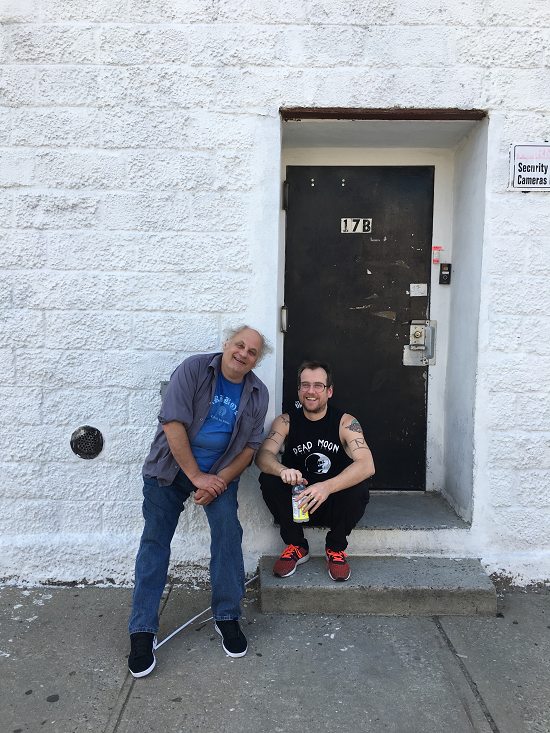
Eugene Chadbourne with Jim McHugh, photo via Post Present Medium
For McHugh, Bad Scene represents something of a tribute to Chadbourne, a man whose extraordinary life and art has to some extent decided the course of his life. “I’ve never told him because I don’t think he would want that sense of gravity, but I do consider him a mentor figure, in a big way.” Not long before they met up for the sessions, another of McHugh’s mentors, the novelist Michael Parker, also a Greensboro native who had served as his writing teacher, had fallen seriously ill. “My first reaction was ‘I need to go hang out with Eugene’,” he says. “This pre-emptive sense of I need to hang out with my mentors before they’re gone. Perish that thought, man, but that was my traumatic reaction to it.”
Speaking to McHugh, it’s clear just how special Chadbourne has been to him, he beams as he embarks on countless asides through the sprawling web of connections Chadbourne has made during his prolific career. “He’s like my psychedelic uncle!” he laughs. Yet he is merely one of thousands. Though Chadbourne’s career is too boundless to be properly contained into a neat legacy, the upside of his absurd workrate is that with his hundreds of records he has reached people in hundreds of ways. Chadbourne is constantly humble and matter-of-fact when it comes to his legacy, yet even he has to acknowledge it. “I can do a gig, for instance at a church in Pisa, for a lot of young students and get requests for three songs off [Shockabilly’s 1985 album] Heaven, them telling me it is their favourite record of all time and changed their life.” Whatever record a fan might choose, “If someone says they really love it, I take that seriously. If somebody said the radio commercial I did for the Trading Post with Richard Petty changed their life, I would take that seriously too.”
Eugene Chadbourne and Jim McHugh’s new album Bad Scene is out now via Post Present Medium. You can purchase it here.

